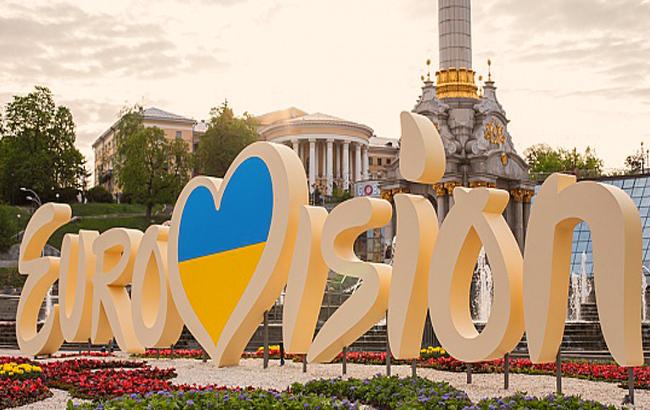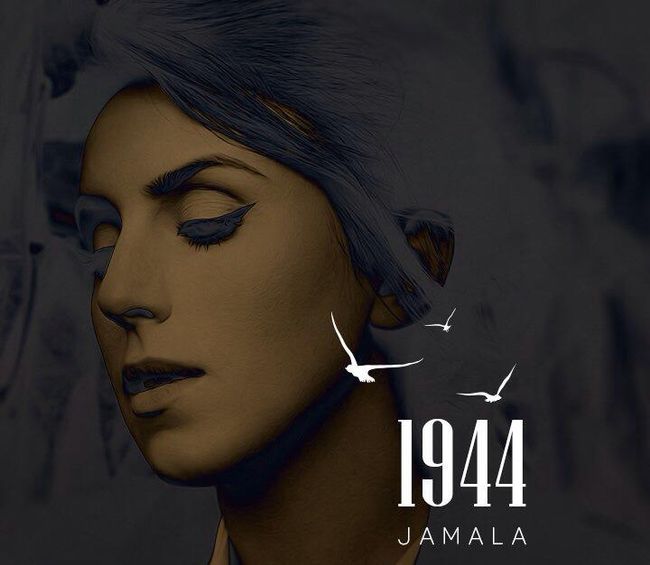The European Broadcasting Union (EBU), the organizer of the Eurovision international song contest, is going to change the rules of the contest to prohibit countries sending participants who might be banned from entering the host country according to its national legislation, the top Eurovision site Esctoday reported. However, this information has not yet appeared on EBU's official site.
Esctoday wrote that after Lisbon was selected as the city hosting Eurovision 2018 on 8, 10 and 12 May, the EBU began to inform national broadcasters of the rule changes. According to the site, the rule modifications were approved during an EBU meeting in June following discussions on the "undesirable incidents" which took place during the Eurovision contest 2017 in Kyiv, when the Ukrainian security service prohibited Russia's Eurovision contestant Yulia Samoilova from entering the country for a performance in occupied Crimea, which is prohibited by Ukraine's national law. In response, Russia withdrew from the contest and did not broadcast it inside the country. A small part of the modifications has been made public by the German national broadcaster ARD.
"Political propaganda" is prohibited
The EBU stressed that Eurovision is a non-political event and that "any form of political propaganda during the event or any political content included in the songs" is to be prohibited. This is likely a reference to Ukraine's Eurovision contestant Jamala, whose performance "1944" about Stalin's deportation of her ancestors, the Crimean Tatars, from their native Crimea during WWII won 1st place in 2016, but sparked discussions about the hidden political connotations to today's plight of the Crimean Tatars in occupied Crimea.
Jamala performs a renewed version of her winning "1944" during the Eurovision contest in Kyiv:
Countries not to send delegates prohibited from entering host country
ESCToday notes that Ukraine's ban of Russia's Eurovision participant Yulia Samoilova was the most unpleasant issue that happened during the contest and that to prevent such incidents in the future, delegations are not to be composed of people under any restrictions on entering the corresponding host country.
Particularly, the information file says:
Neither selected artist nor any member of the delegation shall have any antecedents likely to prompt the host country’s national authorities to deny them access to the host country, in accordance with applicable national law.
On 22 March 2017, Samoilova was issued a 2-year ban on entering Ukraine after it became known to the security services that the artist had participated in a Russian state-sponsored concert in Kerch, occupied Crimea, in 2015, which meant that the artist broke Ukrainian national legislature, which allows foreigners to enter the occupied peninsula only through mainland Ukraine, and was automatically blacklisted from entering Ukraine among with others who illegally entered Crimea.
Additionally, EBU stresses that national broadcasters should choose juries who are independent and "not related with the participating songs or artists in any way that could affect the final outcome."
Furthermore, each national broadcaster has to ensure that the jury members do not reveal any of their preferences and voting intentions before the voting process, neither to share information with the rest of the jury members.
Such a decision of EBU is a positive development, given Russia's choice of sending Samoilova to Ukraine has been overtly accused of being a political manipulation designed to create bad PR for Ukraine: after all, banning a disabled contestant in a wheelchair doesn't resonate well with the slogan Ukraine developed for Eurovision, "Celebrate Diversity" - even if the disabled contestant under question broke the law.
The fact that Russia chose Samoilova as its Eurovision contestant in an opaque manner lends credibility to the assumption that she was nothing but a pawn in an international scandal designed by Moscow. In an interview to Meduza, Samoilova revealed that she received a proposal to participate in Eurovision in February 2017, was selected as Russia's candidate in March via an internal selection process with no audience participation at Pervyi Kanal,
Russia's national broadcaster, and was then given a song to learn in English, a language which Samoilova had trouble speaking, and which she started learning with a teacher.
"Let's put it this way, I don't know English at all. We had no teacher in the school where I studied. He appeared only at the end of my studies, and we learned what we could over two years. I had almost nothing left in my head," Samoilova told.
Samoilova's song for Eurovision, which she didn't perform in Kyiv:
Thus, Yulia Samoilova was chosen without audience participation, through an internal selection process of a Russian state-owned channel by a committee which could not have been oblivious to the fact that their candidate had in the past broken the law of the host country, as the concert in Crimea was sponsored by the Russian government, and tasked with learning an emotional song she would have trouble singing.
All this makes it extremely probable that the Samoilova scandal was no coincidence but a carefully selected move. The recent Eurovision rule changes will make it harder to repeat such stunts.
Keeping timetables
In what is likely to be a stab at the Kyiv organizing committee, Esctoday wrote that the EBU will be more strict to the host broadcaster in making sure that the agreed timetables are kept, and keep the right to break the agreement if the broadcaster fails to do so and request another broadcaster to host the event.
During preparations, a part of the Eurovision organizing committee in Kyiv had resigned
, blaming a lack of transparency. In result, many processes were delayed.
Esctoday also noted that the host broadcaster must ensure "all participating artists are able to perform live on stage and, of course, to ensure the non-political character of the Eurovision event," which could be a reference to the amazing lack of security during the Eurovision performance in Kyiv, when the famous prankster Vitaliy Sediuk mooned Jamala on stage in an Australian flag:

Earlier, Zurab Alasania, the chairman of the Board of Ukraine's National Public Broadcasting Company (NSTU) said that EBU assigned Ukraine to pay a EUR 198,000 fine for banning Samoilova and that NPBC had 20 days to appeal the decision.
On 4 May 2017, the chairman of the Eurovision organizing committee, Frank-Dieter Freiling, said that he envisioned the introduction of sanctions against both Russia and Ukraine for violating Eurovision rules. This may be a fine or a ban on participating in the contest for up to three years.
On 29 June 2017, the EBU stated that it is not going to impose sanctions on Russia over its refusal to broadcast Eurovision-2017, but will fine Ukraine over banning Samoilova and due to delays in organizing the contest in Kyiv.
Additionally, the Geneva Bank has frozen EUR 15 mn of insurance which the Ukrainian government has allocated on the eve of Eurovision-2017 in the event of possible remarks from the EBU. The grounds for this arrest of funds and its initiator are still unknown. The NSTU hired a law firm from Switzerland to find out all the circumstances of the case. The EBU noted they had not initiated the arrest of funds.
One of the possible reasons for this arrest may be a lawsuit of Euronews against the NSTU from 12 May 2015. In 2014, the predecessor of NSTU ceased the cooperation with Euronews. Then the latter filed a lawsuit filed with the Commercial Court of Kyiv to collect EUR 10.6 mn from the NTSU for an overdue license fee. On 19 April 2017, the NTSU lost the case in the appeal over this lawsuit.
Read more:
- Five things to know about the Eurovision song contest in Kyiv
- How Eurovision became the Kremlin's mousetrap
- Eurovision, Russia, and weaponized disability
- Is military aggression at the heart of Eurovision’s values? Open letter in protest of EBU statement
- After visiting Eurovision, most EU citizens want to see Ukraine part of EU
- There is #NoEurovisionFor 44 Ukrainian hostages of the Kremlin
- EBU, Samoilova is a political candidate & instrumentalized to threaten Ukrainian security
- Ukrainian public broadcaster urges Eurovision to respect Ukraine's sovereignty
- Know Kyiv like a local. Some insights for Eurovision visitors
- Eurovision 2017 mass resignations blamed on lack of transparency
- Gerard Depardieu, the Eurovision contestant, and other Russian artists Ukraine banned
- Russian-hybrid forces kill four civilians in Donbas amid Eurovision grand final




